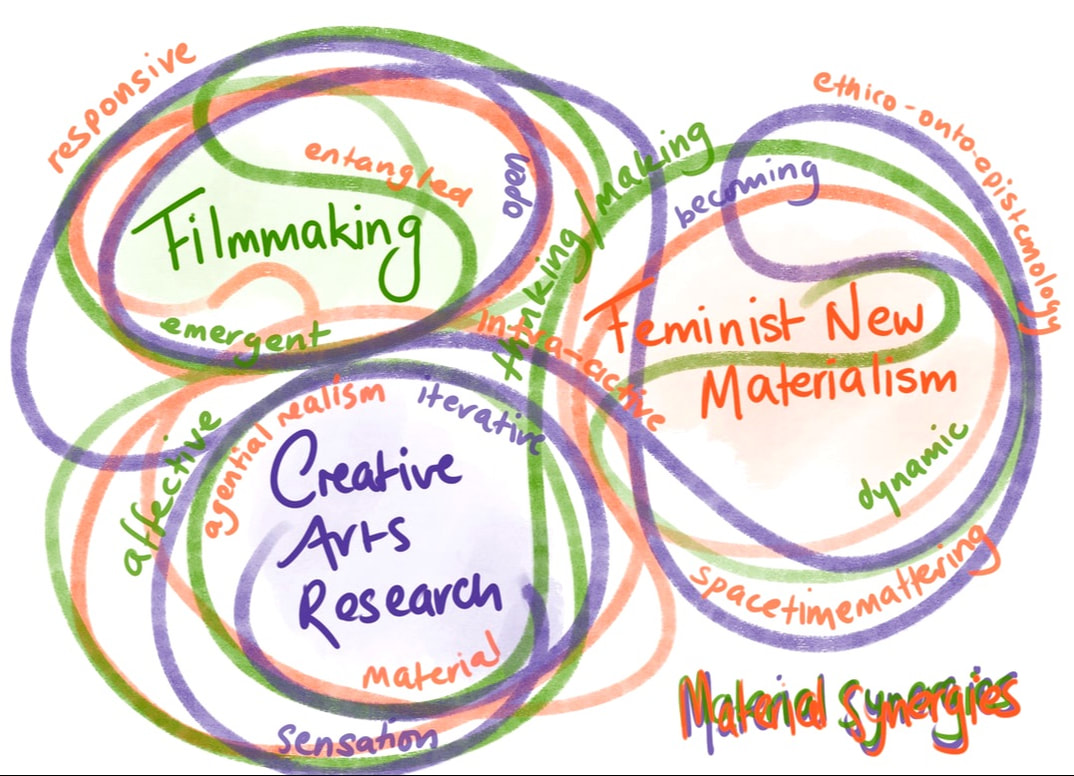|
In reading and thinking about theory and practice I’ve been struck by the synergies between feminist new materialism, creative arts research and my experience of filmmaking practice. Feminist new materialism, informed by the work of philosophers Gilles Deleuze, Felix Guattari, Karen Barad, Rosi Braidotti and Donna Haraway, challenges the centrality of the human experience as a guiding premise in social and educational research and rejects notions of knowledge as binary, static and essentialist (Taylor, 2016, p. 5-24)). Barad’s theory of agential realism demands an engaged material practice in which ethics, being and knowing are inseparable, and matter, affect and discourse are relationally intertwined and co-constituted (Barad, 2007, p. 137-41). Barad’s conception of meaning as dynamic and created through the intra-action of matter through space and time resonates with my experience of documentary filmmaking as a thinking/making process in which meanings are multiple and slippery, emerging affectively through space and time. The idea of thinking through making is echoed in theories of creative arts practice. For philosopher, artist and cultural theorist Erin Manning art is “a way” rather than a destination, with making “a thinking in its own right” (Manning, 2016, p. 28). Similarly, creative arts researcher Estelle Barrett conceives of art making as a process in which new knowledge and new language emerge in the intra-action of sensation, materiality and thought; and in turn in the intra-action of the artefact with the world, as it is viewed and experienced by an audience (Barrett & Bolt, 2014, p. 6-7).
Filmmaking can be both highly pre-conceived and/or emergent: requiring deep awareness, openness and flexibility to respond to what emerges in the process of making through space and time. In my experience observational documentary making can be emergent. You begin with a notion of what the film is about, the people you will film, their situation, and the filming equipment you have determined will suit the purpose. In thinking about how this predetermined structure influences the process of making and meaning, it’s helpful to draw on Barad’s conception of the researcher and research apparatus as always entangled in dynamic and engaged intra-action with the human, non-human and more-than-human matter they seek to explore. (Barad, 2007, p. 142-6) The filmmaking process itself is composed of many micro intuitive decisions or responses that emerge through the intra-action between the filmmaker, her conceptual framing, the filming equipment, the people she films, and the material objects and environments they encounter through space and time, and the affective flows between them. The editing process is similarly generative, with meanings discovered in the assemblage and intra-action of moving image, sound, affect and thought. The meaning of the finished film continues to emerge as it intra-acts affectively with audiences, contexts and times. The process of reading and thinking about new materialist theory and creative arts research has prompted me to consider how my implicit understandings of filmmaking as a practice are both affirmed and enriched by thinking through these theoretical lenses. This seems a productive place to start thinking about the key question in my research: how can filmmaking be used as a participatory arts-based method to trace young people’s affective everyday experiences and understandings of gender and gender equity in their secondary schooling? References Barad, Karen. (2007). Meeting the universe halfway: quantum physics and the entanglement of matter and meaning. Durham: Duke University Press. Barrett, Estelle, & Bolt, Barbara. (2014). Material inventions: applying creative arts research. London: I.B. Tauris & Co. Ltd. Manning, Erin. (2016). The Minor Gesture. North Carolina, US: Duke University Press. Taylor, Carol A. (2016). Educrafting a cacophonous ecology: posthumanist research practices in education. In Carol A Taylor & Christina Hughes (Eds.), Posthuman research practices in education. Houndmills, Basingstoke: Palgrave Macmillan.
0 Comments
Leave a Reply. |
BlogMy thinking about filmmaking as an affective, emergent mode of inquiry to explore experiences of gender in secondary school with young people through my doctoral research. Archives
December 2022
Categories
All
|
